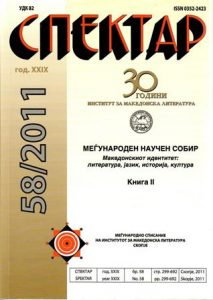РАЗЛИКИТЕ ВО НАЧИНОТ НА НАРАЦИЈА ВО ЧЕШКАТА И МАКЕДОНСКАТА ЛИТЕРАТУРА
DIFFERENCES IN NARRATION IN CZECH AND MACEDONIAN LITETERATURE
Author(s): Radim OshmeraSubject(s): Novel, Comparative Study of Literature, Czech Literature, Macedonian Literature
Published by: Институт за македонска литература
Keywords: novel; prose; narrative; story; literature
Summary/Abstract: The essay submitted here is part a doctoral project dealing with modern prose in the Czech Republic, Macedonia, and Germany. The goal of the essay was to analyse and compare two modern novels. Both novels can be classified as lyricising prose, which in many cases takes the transformation of narration into lyric-reflexive thought as far as this process can go. Both novels have their roots in the same impulse and are thus thematically very similar. Both novels deal with the figure of the father, and the narrator – in one case a son, in the other a sequence of all the father's children – attempts to come to terms with the death of his (or their) father, his life, and his deeds on this earth. It is nevertheless clear that the two novels are stylistically very different. The differing grammar or texture of the two novels is due to each author's peculiar way of writing. While with Kacarov we are talking about two or three levels of narration, with Balaban we already have five. While Kacarov's story has just one main active hero, Balaban's has several active heros, i.e. all the narrators as well as the subject of the story, the father himself, with all remaining active figures for the entire length of the novel. Kaсarov only gives the father a story, whereas with Balaban each of the novel's figures has a particular story. The most striking difference lies, nevertheless, in these authors' attitudes towards their subjects. Kacarov's tale intentionally avoids dealing with alienation and refuses to pose questions. The whole book is covered in a nostalgia so strong that it almost seems mythical. A monument has been created, a sort of legend of the Father-Saviour. Balaban takes a different course. Even his title hints at the fact that his story will be neither legend or myth, nor even a declaration. Instead, it will search and ask questions. Kacarov's book is quite intentionally uncritical towards its subject; rather than searching, it simply affirms his existence. Balaban's novel, on the other hand, is a painful examination of the futility of all that we love, and of all that we so uneasily touch in the course of our lives.
Journal: Спектар
- Issue Year: 2011
- Issue No: 58
- Page Range: 661-668
- Page Count: 8
- Language: Macedonian

